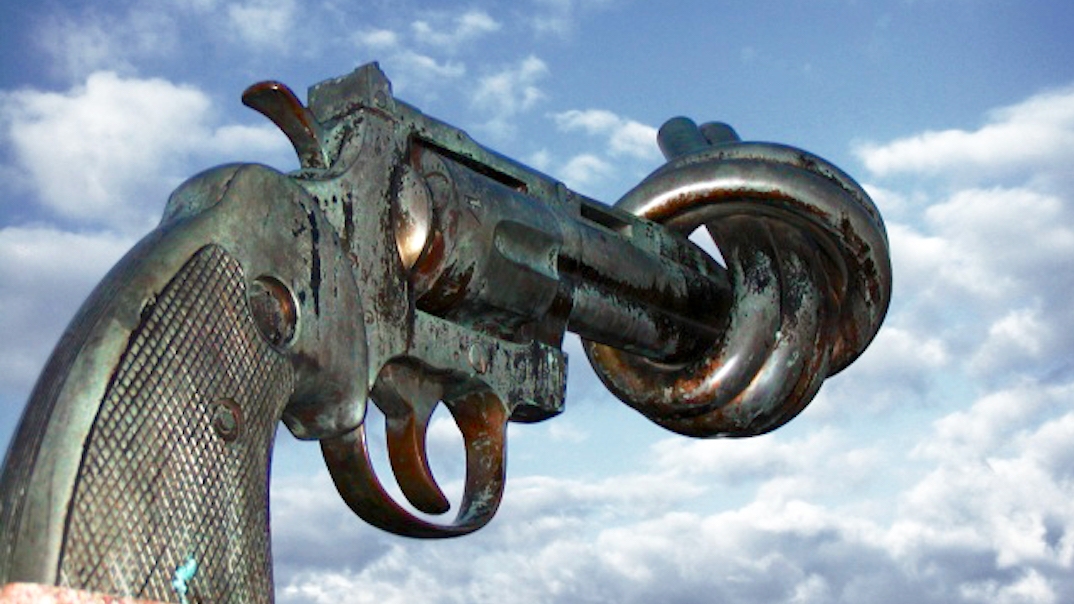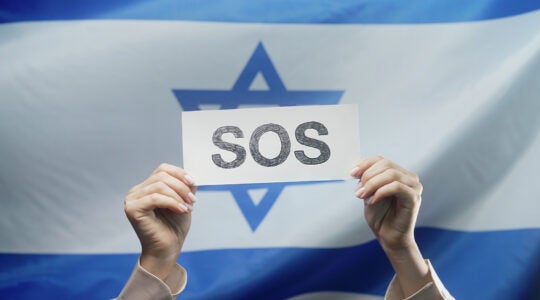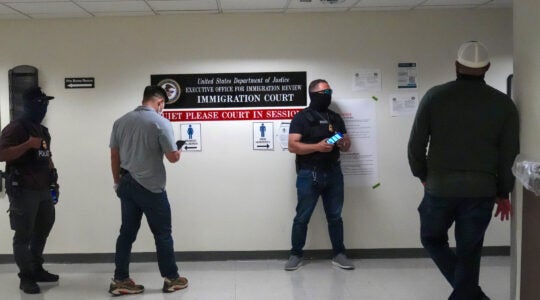(JTA) — Late last month, Jacob Frey, the Jewish mayor of Minneapolis, vetoed his city council’s resolution endorsing a ceasefire in the Israel-Hamas war, calling it “a one-sided resolution that adds more division to an already fraught situation.”
On Thursday, the council voted to override his veto, adopting a resolution that calls for a “permanent ceasefire” and places the war squarely “in the context of the 75-year displacement of Palestinians.”
Overridden but unbowed, Frey issued his own ceasefire proclamation. Like the council’s, it calls for an immediate ceasefire, the return of Israeli hostages and humanitarian aid for Gazans.
Unlike the council resolution, it specifically endorses a two-state solution, eliminates a call to end U.S. military aid to Israel and makes no reference to accusations in the International Criminal Court and elsewhere suggesting that Israel is carrying out genocide.
“It differs from the resolution passed by council in that it attempts to honor, uplift, and include Minneapolis residents across faiths,” Frey explained on Instagram. “We need more unity right now, and furthering [division] and hate at home does not help achieve peace abroad.”
The differences between the two proclamations are both subtle and pointed, and typify a fierce debate over “ceasefire,” a word that has come to carry a host of meanings and more emotional and political baggage than its plain definition implies.
For many defenders of Israel, calls for a ceasefire suggest Israel surrender its right to defend itself and eliminate an enemy that slaughtered 1,200 Israelis and kidnapped 250 others on Oct. 7 and would surely try to do it again. That many of the early calls for ceasefire came from groups that disdain Israel is reason enough to reject the term, many argue.
Even those who might now support a pause in the fighting that would allow the return of some or all of the hostages and humanitarian aid for displaced Palestinians ask why Israel should agree to end a war they consider just and necessary.
“A premature ceasefire, without ensuring the elimination of Hamas’ military and governing capabilities, will only prolong that organization’s reign of terror over the people of Gaza, perpetuate its threat to the Israeli citizenry, and doom any prospect of a political end to the Israeli-Palestinian conflict,” said Ted Deutch, CEO of the American Jewish Committee, in a statement.
As for proponents of a ceasefire — a growing number of city councils across the United States, NGOs, left and far-left Jewish groups and the pro-Palestinian supporters they sometimes march with — the term can signify a range of positions. For the far left, which includes many anti-Zionist Jews, Israel is solely to blame for the conditions that led to the Oct. 7 attacks, and stopping the war means nothing less than preventing the genocide of the Palestinians in Gaza.
Some Jews calling for a ceasefire express sympathy for Israel and its security dilemma but are moved by the enormous civilian death toll in Gaza and want the war to cease on humanitarian grounds. And some progressive and even centrist Zionists wonder whether the huge scale of bloodshed will weaken Israel politically and diplomatically without eliminating the threat of the Hamas ideology.
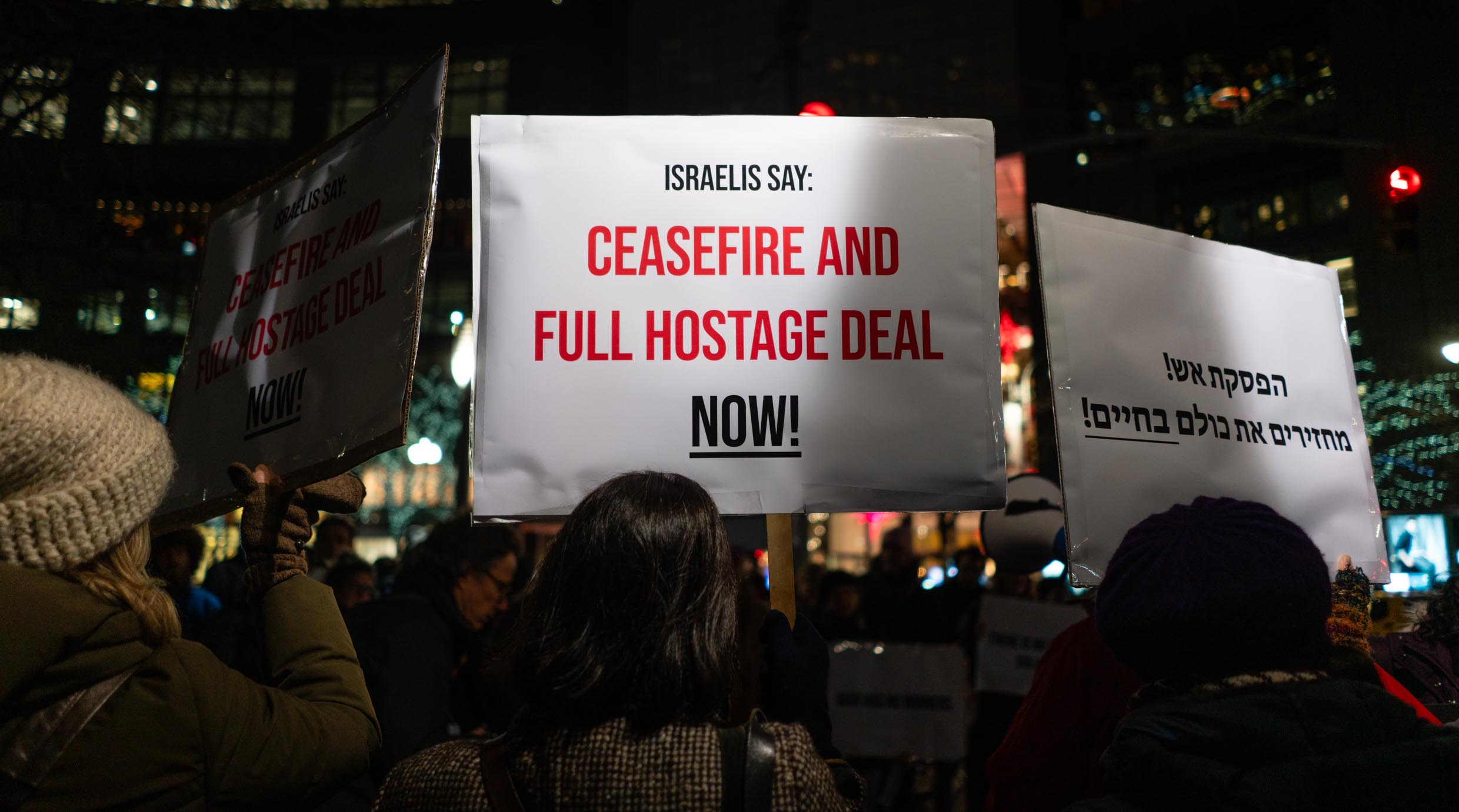
Left-wing Israelis protest in support of a Gaza ceasefire and the release of Hamas hostages, in midtown Manhattan, Dec. 20, 2023. (Luke Tress)
On Wednesday, more than 30 Israel-based civil society and human rights organizations called for “an immediate ceasefire in the Gaza Strip and demand the immediate release of hostages held in the Gaza Strip.”
“An immediate ceasefire will prevent further loss of civilian lives and facilitate access to vital aid for Gaza to address the unprecedented humanitarian catastrophe there,” read their petition. “These steps are vital for ensuring human rights and security for Israelis and Palestinians alike.”
Among the North American Jewish mainstream, however, the word is seldom used. Only one member of the 50-member Conference of Presidents of Major American Jewish Organizations — Americans for Peace Now — has issued a call for a ceasefire. On Jan. 22, the left-wing Israel advocacy group J Street said it is time for a “negotiated stop” to the fighting, but pointedly did not use the word “ceasefire.”
And when the Biden administration suggested the euphemistic “humanitarian pause” in the fighting last November, the right-wing Zionist Organization of America called it “pro-Hamas and anti-Israel.”
What terms are used to describe a stop in the fighting — “ceasefire,” “humanitarian pause,” “cessation of hostilities” — are less meaningful to scholars and lawyers than they are to politicians and activists, explained Virginia Fortna, professor of U.S. Foreign and Security Policy at Columbia University. “A lot of the words just end up getting used interchangeably, and the distinctions are not super meaningful,” she said. “‘Ceasefire’ is a catchall term for lots of different kinds of things, from a very local and temporary pause to a unilateral ceasefire and all they way to a formalized, negotiated” agreement.
More significant is the distinction between ceasefire and “armistice,” which means a permanent end to the fighting. Fortna, who has written a book on the durability of ceasefire agreements, has been following the Israel-Hamas war and looking past the ceasefire debate to what happens next. “What could a peacekeeping mission look like?” she said. “Who could be involved, and be trusted enough and be seen as impartial enough to both sides and allay serious mistrust?”
The Jewish debate over “ceasefire ” is felt keenly in the Reconstructionist movement, whose 95 affiliated congregations and 370 rabbis tend to lean to the left. The movement hasn’t called for a ceasefire; rather, in an essay on Dec. 21, Rabbi Maurice Harris, the movement’s Israel Affairs Specialist, described two camps among rabbis and congregants. Those calling for an immediate ceasefire, he wrote, hold mainstream views about Israel but argue that “the most important of our Jewish values now is the prohibition against the killing of innocents,” and they distrust Israel’s leadership.
Opponents of an immediate ceasefire defend Israel’s right to self-defense and feel “that allowing Hamas to remain in power would be a grave mistake that would harm Israelis and Palestinians in the long run.”
In an interview, Harris noted that a “disproportionate” number of rabbis in the Reconstructionist Rabbinical Association are part of Rabbis4Ceasefire, a group that issued its first call for a ceasefire on Oct. 20 — a full week before Israel launched its ground invasion of Gaza. At the same time, there is a cohort of Reconstructionist rabbis more closely aligned with their local Jewish federations, “who want to see the movement aligned more vigorously and publicly with the calls for solidarity that come from” the Jewish Federations of North America.
“Speaking personally, one of the things I find a little confusing about the most visible calls for ceasefire is they don’t seem to respond when there’s an offer on the table for a temporary pause in the fighting and Hamas says no,” he said. “If the most important thing is for the killing to stop, I would think some of the ceasefire folks would be protesting Hamas’ refusal to go ahead and accept a deal even for a temporary ceasefire .”
The Reform movement also hasn’t issued a call for ceasefire, even though its statements condemning Hamas and supporting Israel’s right to self-defense clearly align the movement with the pro-Israel left. They include calls for “an end to the West Bank occupation,” condemnation of settler violence against Palestinians and support for a Palestinian state.
Rabbi Rick Jacobs, president of the Union for Reform Judaism, said he is sympathetic to the calls for ceasefire — including one issued by more than 1,000 current and former members of the URJ in December. “‘Ceasefire’ as a standalone call I think for some people is just a cry from the heart for the humanitarian disaster which war always is, and this war is no exception,” he said.
But Jacobs said his movement can’t get behind a ceasefire “that preserves Hamas’s current role as governor and military force in Gaza.”
“This war will end with a negotiated ceasefire — that’s how the world works,” he continued. “What matters greatly is what comes after. The hostages have to be released. And I think who governs Gaza after the cessation of hostilities is really important.”
As often happens in polarizing political debates, a term becomes toxic when it gets too closely associated with one side or the other. Pro-Palestinian protesters were early in calling for a ceasefire, in some cases within days and even hours of the Oct. 7 attacks. Some of these demands were also coupled with positions and rhetoric that many Jews, including those on the left, couldn’t countenance. A controversial letter signed by Harvard Palestine solidarity groups calling for “action to stop the ongoing annihilation of Palestinians,” issued Oct. 9, held “apartheid Israel … entirely responsible for all unfolding violence.” A “Ceasefire Now” resolution introduced Oct. 16 by 13 Democratic progressives in the House of Representatives did not call out Hamas’ unprovoked attack on Israel or mention the hostages. A “Ceasefire Now” petition by the anti-Zionist group Jewish Voice for Peace declares that Israel “is committing genocide against Palestinians in Gaza.”
“The rape denialism among progressive groups, the slanderous overreach in characterizing Israel’s behavior as genocide, the quick leap to calls for ceasefire instantly after Oct. 7 — denying Israel the legitimacy of self-defense — and the regular omission of calls to release the hostages as part of the ceasefire conversation are all colossal moral failures,” wrote Yehuda Kurtzer, president of the Shalom Hartman Institute, in an essay in the Forward last week defending “the moral and political necessity of Israel’s military response.”
Kurtzer elaborated in an interview. “We’re not really talking about the legitimacy of ceasefire,” he said. “Everybody wants that.” Both sides have been negotiating over terms for a ceasefire, and both sides have rejected offers. “When I wrote my piece in the Forward, I got accused by people on the left as being pro-genocide. They’re basically saying those are your two options — either you are pro-ceasefire, or you are pro-genocide, which is morally obtuse.”
Rabbi Alissa Wise, a founder of the JVP rabbinical council, is also the lead organizer for Rabbis4Ceasefire, whose Oct. 20 statement called for “a complete ceasefire now” and the release of all Israeli hostages. She said she and other organizers agreed that the new coalition wouldn’t “officially be a JVP project.”
“We knew that JVP and other organizations have their baggage, and we didn’t want to create any reason why a rabbi whose Jewish values led them to call for a ceasefire” wouldn’t be able to express that publicly, she said in an interview. “We didn’t want to create any barrier to their participating in this call.”
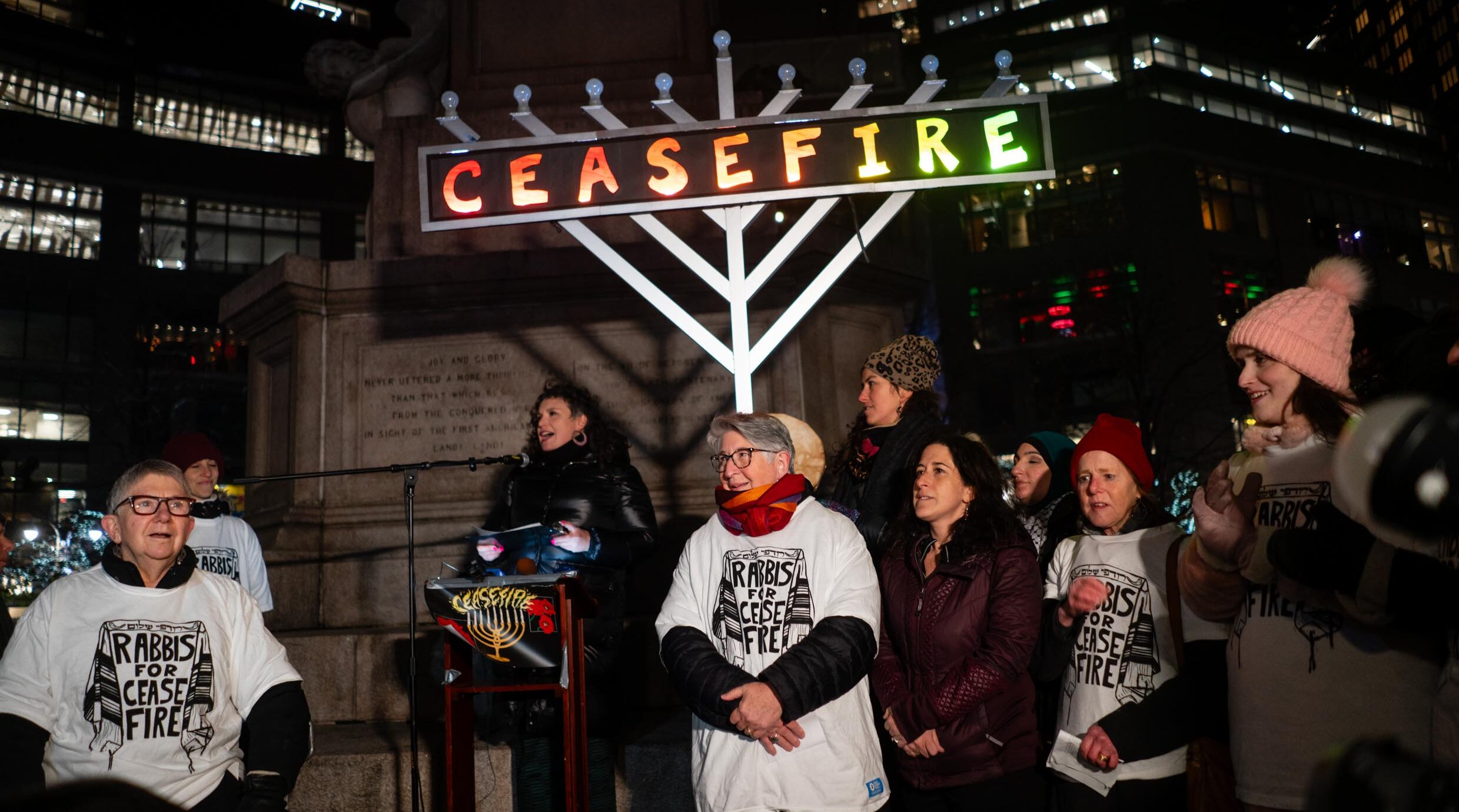
Left-wing activists rally in support of a ceasefire between Israel and Hamas on the first night of Hannukah in Columbus Circle, New York City, Dec. 7, 2023. (Luke Tress)
As of Wednesday, 275 rabbis had signed their petition. Members have protested at the United Nations, held a Hanukkah vigil in New York’s Columbus Circle and prayed in front of the U.S. Capitol.
“Fundamentally, there is no military solution and there needs to be a diplomatic one, and that also includes prisoner exchange and a return of the hostages,” said Wise, who noted that the return of the hostages was always a condition in her group’s call for a ceasefire. “The only time the hostages have come home safely is during a ceasefire.”
She also rejects the idea that a ceasefire undermines Israel’s right to self- defense. “From the beginning, this idea that Israel’s goal is to eliminate Hamas is a vengeful fantasy. You can kill people, but you can’t eliminate an ideology,” she said. “Hamas recruits their fighters from people who have had family members killed by Israel. There are hundreds of thousands of people that are now it that category.”
Wise also says she also hears from rabbis who won’t sign on to Rabbis4Ceasefire because they risk losing their jobs. “There’s such a chilling effect for speaking out for a ceasefire,” she said, adding that the fact that five times as many rabbis joined Rabbis4Ceasefire than those who had been part of the anti-Zionist JVP’s cabinet suggests that there are “longtime progressive Zionist activists” looking for a place to express their concern for Israeli Jews and Palestinians.
One of those rabbis is Rachel Kahn-Troster, the executive vice president at the Interfaith Center on Corporate Responsibility. “For me, just calling for a ceasefire was so morally important,” said Kahn-Troster, who previously worked at T’ruah, the rabbinic human rights group. “I was less concerned about the perceived toxicity of the groups [calling for a ceasefire] in this real moment of urgency.”
Kahn-Troster said she grounds her values in the Jewish teaching that all people are created in the image of God, and in the imperatives of human rights. She has been heartened by the Israeli human rights groups calling for a ceasefire. “The call for release of detainees on both sides is really important, but for me the most important piece is that what is happening in Gaza is so horrifying and continues to be horrifying,” she said. “I recognize that to some people that may sound naïve, and that there are a lot of really important questions that need to be answered to ensure safety and security for both Palestinians and Israelis.
“But at this moment, the most urgent thing is to have a ceasefire so that Palestinians re-enter and rebuild, and to just end the scale of death and destruction that is happening.”
Rabbi Jill Jacobs, the CEO of T’ruah, acknowledges that the early adopters of “ceasefire” had essentially co-opted the word and the concept. “That word just became associated with not caring about Israeli lives or caring about the hostages,” she said. “So, unfortunately, that word ended up becoming toxic, even though it shouldn’t be.”
In December, Jacobs put out a statement urging the U.S. government to negotiate “another ceasefire,” following the six-day break in November, that would release the remaining hostages, provide humanitarian aid to Gazans and end the war “as quickly as possible.”
As the death toll among Palestinians in Gaza and Israeli soldiers continues to rise, said Jacobs, she is seeing more discomfort among Jews about how the war is being carried out and its rising death toll among Palestinians and Israeli soldiers.
“I think that’s why it is important to take that word back,” she said, referring to “ceasefire.” “Yes, we understand that there were some people calling for a ceasefire too early. There are some people who were saying ceasefire without any concern for Israelis or, worse, support killing Israelis.
“But that word does not have to be associated with those ideas. And we very much can take it back and say, this is actually what’s good for Israel right now, and certainly for Palestinians.”
JTA has documented Jewish history in real-time for over a century. Keep our journalism strong by joining us in supporting independent, award-winning reporting.

